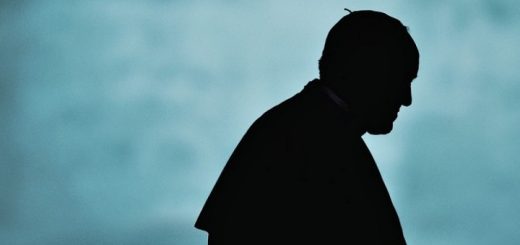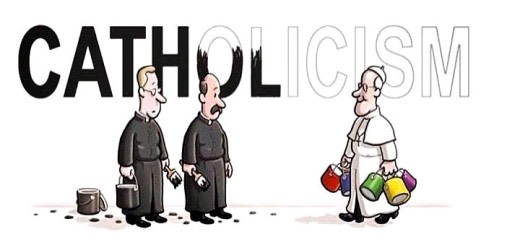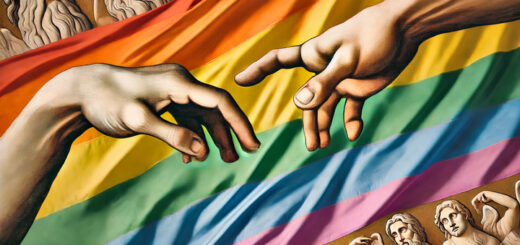What is the place of LGBT+ people in the Catholic Church?
Article taken from the website of the Katholische Jugend (Catholic youth) of the Diocese of Vienna (Austria), freely translated by Michele D'Adamo
About two years ago, a volunteer of Katholische Jugend (Catholic youth) He told me about how he had realized that he was a lesbian. If a relationship begins, he does not want to hide it, but rather to talk about it openly. He thought he would have no problems from a personal point of view, but he offered to interrupt his volunteer work in order not to damage the image of the Katholische Jugend if his relationship had come to light. This conversation shocked me: not for the aforementioned sexual identity, but for the assumption that due to its orientation it could not (more) have placed in the Church.
How do homosexual people live in the Church, in our groups and in our parishes? And how do we react from the Church to people who come out by declaring their homosexuality?
Don't Ask, Don't Tell
Sometimes we have the impression that the policy of the Don't Ask, Don't Tell (Do not ask, not to say), as was customary until recently in the American army: just don't talk about it. This attitude cannot benefit homosexual people and their community, but not even our parishes and groups. The need to hide cannot be a Christian or spiritual attitude! Thus also states the ecclesiastical magisterium in the catechism of the Catholic Church: homosexual people "[...] must be treated with respect, empathy and touch. We must not make them feel unjustly left aside in any way. These people are also called to perform the will of God in their life and, if they are Christian, to unite the difficulties that can derive from their being to the sacrifice of the Cross of the Lord". (KKK 2358)
Regardless of the fact that the immediately previous and subsequent sections of the catechism describe homosexuality as an "aberration", and affirm that homosexual acts are "intrinsically wrong" and that people with homosexual orientation are therefore called to chastity, it should be emphasized that the magisterium invites "respect, empathy and tact" towards them. Such a respectful treatment excludes "unjust discrimination"; In other words, people who have decided to be open on their sexual orientation should obviously find a place in our parishes, groups and ecclesial organizations.
The pastoral council of the diocese of Linz, for example, in 1999 said: "The discrimination of people because of their homosexual orientation cannot be based on Christian principles. These women and these men, like all the others, are invited without reservations to live, celebrate and collaborate in our congregations and ecclesial organizations".
However, this raises the question of what we went on in our daily practice. The clamor (largely media) aroused by a homosexual parish councilor elected last year has clearly shown that respectful behavior is still far from being the norm.
Homosexual people defend themselves from being reduced by the Church to the sin of the physical expressions of their love and their relationship because of their sexual identity, and are regularly called to repentance and renunciation:
“I see no need for repentance or conversion regarding the relationship with my girlfriend. I try to live in agreement with my deepest interiority and to be on the side of myself and of God.
Thanks to this relationship, my heart is more open and wider, my life is more alive. If it is not disturbed by external factors, my soul finds rest, peace and security in this relationship, and the
The fact is that my girlfriend is right for me, and I'm right for my girlfriend. We both benefit a lot of each other, I don't know how innate or inherited it is or how much I know, but I know there is love ". (cit. From a letter from a young woman to an Austrian bishop)
He continues by writing that the relationship persists and that the two women share the life of a couple, with all its facets.
Sign of hope
However, there are some signs of hope, that is: even the representatives of the ecclesiastical hierarchy are changing their mind. This is due not only thanks to the personal intervention of Cardinal Schönborn in the aforementioned case of the parish council of Stützenhofen, but also thanks to the declarations issued by the archbishop of Berlin to Katholikentag last year. Here Cardinal Rainer-Maria Woelki had urged a positive attitude towards homosexuals; Making explicit reference to the catechism, he stressed that among them there are many who assume a lasting responsibility towards each other and promise to be faithful. Therefore, "homosexual relationships should not be considered a 'violation of natural law'" (quote from the newspaper Die Welt, June 27, 2012).
Regardless of the speculations on how homosexuality develops or arises, homosexuals live their sexual orientation as a part of their personality that forms their identity. In this regard, the speculations on the possible "care" (which are based on the pathological nature of sexual identity and aim to change the behavior that goes against personality) do not make sense and do not do justice to the reality of the life of many homosexual people. Of course, the statements of the Austrian bishops (in the framework order "The truth will make you free") do not apply only to heterosexual people: "Each person lives his sexual identity as a constitutive part of his own personality. Sexuality as a loving and pleasant experience of the body, just and of the partner [...] belongs to the most intimate being of the human person, who according to the Christian vision is understood as unity of flesh and soul.
Even if nothing changes in teaching the Church - according to which sacramental marriage is possible only between a man and a woman - it would already be possible for the Church itself to recognize the birth of a "registered union" as an expression of two people who take responsibility for each other and who promise to be faithful, and accompany it, for example, with their own blessings. In any case, in our parishes it should be possible for homosexuals to support one's identity without being hindered or discriminated against, whether it is the parish council, the parish groups, the group leader of a youth group, the parish Caritas, etc. etc.
There is no place for discrimination
It is out of any doubt that in the communities and in Christian groups there should be no space for the deeply offensive and unfair prejudice based on the general suspicion that homosexual people are more likely to commit abuses against children and young people. The reference framework of the Church "The truth will make you free" says unequivocally: "It is wrong and unfair to assume that homosexual orientation people have a greater tendency to sexual violence. The equation of homosexual people to the 'harassing boys' must be categorically rejected. It must not find space in ecclesiastical practice". If these discriminatory statements are still verified sporadically, those who support this opinion must be contradicted firmly. If the people who deal with pastoral care make comment about it, the respective superiors must be informed.
In particular, teenagers and young adults who identify homosexuals should feel in good hands in ecclesial groups and should be motivated (also through the meeting with "models") to open up on their orientation. In light of the numerous cases of discrimination and denigration in the school environment, for example, their self -confidence should be strengthened in ecclesial groups and should experience the experience of being accepted.
Unfortunately, in the pastoral accompaniment of homosexual people and their community there is still very refusal and suffering, often due to ignorance and prejudice. To provide competent support in this area, many dioceses have created specialized centers for the pastoral care of homosexuals in collaboration with the consultancy offices for partners, marriage, family and coexistence. Already in 1998, the legendary Don Joop Roeland had been in charge of the pastoral care of homosexual people in the Archdiocese of Vienna; Unfortunately, after his death in 2010, the department did not remain in operation.
While the Protestant and Vetero-Catholic churches in Austria have recognized the homosexual unions, the Roman Catholic Church still has many difficulties in doing it. In particular, the definition that homosexual relationships are "intrinsically disordered" makes the recognition of homosexuals in the near future unlikely.
The repeated interventions of the Church against the laws aimed at equating the rights (and duties) of homosexual and heterosexual unions have also led to a great loss of trust in the Church by the lesbian and gay community. Despite all reserves and taking into account the well -being of the child, the possibility of the so -called Stepchild Adoption (The adoption of an biological child who one of the two partners "brought" in the relationship) would also be possible in homosexual unions without great difficulties.
The opinion of the Church is still decisive on the question of considering homosexuality a sin or 'if this categorical prejudice should be reduced. Once again, the young woman I mentioned at the beginning has the last word:
"I believe that God wants life in abundance for every single person, for each individual person in his uniqueness. For some this means a heterosexual relationship, marriage, children. For others, a celibate life. And for others, it means living with a partner of the same sex. I see no evil in the union between people of the same sex, no damage to society and no distance from God (which would be a sign of sin).
- Nobody besides myself can judge my closeness to God.
- Several people have told me that I have changed since I started this relationship: I have become more relaxed, softer, more human.
- And since I have changed for the better, this is also a benefit for society, especially for all the people I encounter.
Rather, I would see as a shame that someone does not follow what he feels his most intimate truth to be".
Original text: „ICH Weiß, Es ist Liebe from ...". Zum Platz Homosexueller in Der Katholischen Kircher






